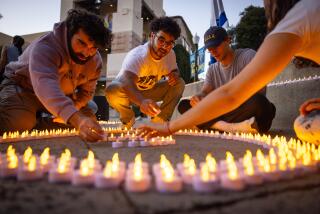Israeli Freedom Fighters Recall Independence Struggle
- Share via
He was the warrior, she the healer. Both Los Angeles residents can gaze back half a century and claim part of another title--founders of a nation.
That nation is Israel, which next year celebrates 50 years of an existence that may not have come about without people like Aaron “Red” Finkel and Esther Friedman. The two Americans were among about 3,500 volunteers--Jews and non-Jews, representing 29 countries and a riot of languages--who flocked to Palestine after World War II to join the war in support of an independent Jewish state.
Those volunteers--many of whom, like Finkel and Friedman, had served in the military in their home countries--bolstered the fledgling Israeli military and showed the ways the world’s Jews answered the call for an independent nation. Americans risked losing their citizenship by violating rules against taking part in foreign wars.
The story of those volunteers, who include about 170 people still living on the West Coast, is receiving fresh attention as Israel prepares to celebrate its 50th birthday. On Sunday in Los Angeles, Finkel and Friedman reminisced about that conflict and the passions that lured them to enlist. Their remarks came before a group, organized by the Jewish Federation of Los Angeles, that will travel to Israel this fall to mark the anniversary.
Finkel and Friedman took very different routes to the conflict in Palestine, where Israel’s declaration of independence in May 1948 prompted an invasion from surrounding Arab countries.
Finkel, now 78 and living in Encino, had been an Army fighter pilot during World War II. He was living in Brooklyn after the war when he saw a newspaper advertisement seeking volunteers for the Israel campaign. A recruiter said the magic words to a Jewish boy who had suffered more than a few slights at the hands of bigots.
“He said, ‘The Jews are going to fight,’ ” Finkel recalled. “He hit me right in the gut.”
Finkel accepted the $30-a-month pay and was on his way to Palestine--a route that took him through Europe and landed him in jail for several days after Italian authorities discovered that the plane he was on was loaded with weapons.
*
Finkel was part of a ragtag squadron of 25 to 30 pilots, a mix of foreign veterans and Israeli flyers. (A member of the nascent force was Ezer Weizman, now Israel’s president.) The group flew Messerschmitt fighter planes originally built for Hitler’s Luftwaffe, but they were aging and often unreliable. Still, they played an important role, Finkel said.
“I’m sure Hitler is spinning in his grave because it was the Messerschmitt” that helped stymie air attacks on Jewish strongholds like Tel Aviv, Finkel said.
Finkel flew 35 to 40 missions, mostly bombing enemy trains, air bases and encampments. He never encountered a hostile airplane in the sky.
The call that suddenly drew Finkel to Israel’s cause had burned for years in Friedman’s heart.
Friedman, now 74, of Reseda, had been a Navy nurse--and a committed Zionist. While in graduate school after World War II, she drafted volunteers on behalf of the underground Israeli movement, sending recruits to a New York hotel to meet a secret contact even she had never seen.
Friedman decided to join the campaign herself, announcing herself at the hotel door of the leader she came to know only as “Major Aaron.”
“It was like in the movies,” she said. Major Aaron was reluctant to allow a woman to join, but Friedman persuaded him that her medical training would help.
The journey was arduous. Friedman made her way to Germany, where she assumed the identity of a former concentration camp prisoner, removing three identifying moles and shaving her head. She joined 500 other volunteers in France for a sea voyage to Palestine. On board the “ship of hell” were 5,000 migrants packed tightly into filthy conditions and with little food for two weeks, she said.
*
On arrival, she and other volunteers hid in the ship’s sewage-filled hold to escape detection by United Nations troops assigned to rebuff potential combatants. When the group jumped into the surf, she was rescued by a man she would by chance meet again years later--and marry.
Friedman said she saw combat just once, a short battle against an Egyptian contingent.
Finkel said the volunteers were crucial to the creation of Israel. But he added, “We don’t think of ourselves as heroes. It was a job to do.”
More to Read
Sign up for Essential California
The most important California stories and recommendations in your inbox every morning.
You may occasionally receive promotional content from the Los Angeles Times.













